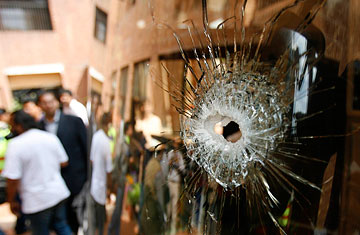
A bullet hole is seen on a window of the bus that was carrying the Sri Lankan cricket team when they were attacked by gunmen in Lahore, Pakistan, on March 3
(2 of 2)
In the wave of terrorism attacks that have scarred Pakistan over the past two years, the perpetrators have normally used improvised explosive devices, bomb-laden vehicles and individual suicide bombers. A full-frontal assault is new. The resemblance it bears to the Mumbai attacks, with young men carrying backpacks and openly brandishing their weapons, suggests to some analysts the possible involvement of Lashkar-e-Taiba, the militant group based near Lahore. (See pictures of Mumbai picking up the pieces.)
Others are pointing to the Pakistani Taliban, al-Qaeda and the Kashmiri separatist group Jaish-e-Mohammed, which has bases in southern Punjab. "My own assessment is that it is a Pakistani militant group," says retired general turned analyst Talat Masood. "Whether it is Lashkar-e-Taiba or Jaish-e-Mohammed, I can't say." Sri Lankan officials say the Tamil Tigers, who are behind an insurgency in their own country, are not believed to be responsible. (Read TIME's brief history of the Tamil Tigers.)
A local television channel captured glimpses of the attackers mounting the attack. Prominent in the footage is a pair of men moving around together, crouching on their knees as they open fire. One appears to be a clean-shaven man young enough to be a teenager who is wearing a T shirt, jeans and sneakers. His companion is a taller man who appears to be in his 20s, wearing a brown shalwar kameez (traditional Pakistani dress) and a beard. One senior police officer in Lahore was quoted by the local media as speculating that the men were Pashtun, the ethnic group dominant in Pakistan's militancy-wracked North-West Frontier Province and parts of Afghanistan.
The brazen nature of the attack and its high-profile targets will sink Pakistan's reputation further, analysts say, driving away foreign investment and delivering a blow to the country's much-celebrated national sport. The Pakistani rupee and the main stock exchange both dipped at the news. "It's a very serious incident that escalates the present state of affairs," says Masood, the retired general. "It gives an idea of how the frontiers of terrorism are expanding in Pakistan. It also shows how Pakistan is vulnerable. It is no longer capable of hosting international events."
The attack comes at a sensitive time for Pakistan, and Punjab in particular. The country's largest and wealthiest province was plunged into turmoil last week after its most popular politician, opposition leader and former Prime Minister Nawaz Sharif, was barred from holding elected office by the Supreme Court in a controversial ruling. The decision sparked angry protests across the province and opened up a major rift with the government. Sharif has held political rallies across Punjab, urging supporters to join this month's lawyer-led "long march" to Islamabad to demand the reinstatement of deposed Chief Justice Iftikhar Chaudhry. Over the weekend, the government staged a vast counterdemonstration in the port city of Karachi. Political analysts fear that the fresh phase of political uncertainty will consume politicians' energies and provide a distraction from the unremitting advance of Islamist militancy.
In a sign of the growing threat, militants have crossed the Indus River from the northwest in recent weeks to mount attacks in the Punjabi towns of Mianwali and Bhakkar. Lahore itself was long considered removed from the threat, not suffering its first suicide bombing until January 2008. Since then, it has seen a spate of major bombings, including attacks on the Naval College and the headquarters of the Federal Investigation Agency.
— With reporting by Vivian Salama / Lahore
